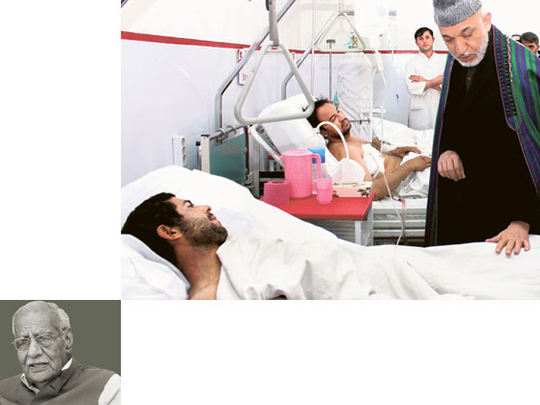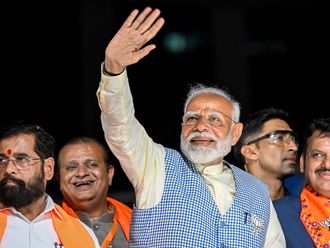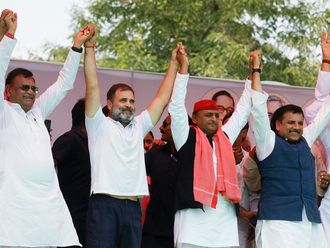
Had US President Barack Obama expressed regret over the killing of 24 Pakistani soldiers in a drone strike immediately, Islamabad's fears might have been assuaged. And Pakistan would have probably attended the meeting on Afghanistan in Bonn.
It is no use crying over spilt milk. However, many in India wonder why Islamabad did not accept ‘regret'. Regret is not exactly an apology but it comes close. It does mean a feeling of sorrow for wrong-doing.
Islamabad would have probably accepted regret if there was no history of deliberate violations by US and Nato forces in the face of Pakistan's protests. The fact is that America and its allies care two hoots for Pakistan's sovereignty or its people's sentiments.
Right from the 9/11 attack on New York, Pakistan has been treated as a country which is at the beck and call of the US. At that time, US secretary of state Colin Powell allegedly rang up the then Pakistan foreign secretary Abdul Sattar to inform his government that they would begin carpet bombing in Pakistan instead of Afghanistan if Islamabad was not on their side.
Pakistan could not dare say ‘no' then. How can it resist the pressure now? True, Pakistan has played tough and has even got an American drone base vacated. But it is bowing to enraged public opinion. I am still unsure how long Pakistan army chief General Ashfaq Pervez Kayani would stay intractable. Over the years, Pakistan's armed forces have become so inured to American weapons as well as aid that a U-turn does not look plausible.
Some rationalisation has already started taking place. Limited cooperation is visible on the ground. A Nato commander has said the tragic incident has not disrupted their operations or cooperation with Pakistan. America's annoyance does not suit Islamabad because China cannot fill the vacuum created by its absence, nor will India help because relations between the neighbours are nowhere at the stage where New Delhi would assist.
Despite the regret over the killings, I do not see Washington behaving differently. It is fighting a war against the Taliban who have a presence in Pakistan. The US and Nato forces will continue to hunt them down, with Islamabad's cooperation if possible or without it if necessary.
Status quo
I do not see the drone attacks stopping or the supply lines to American and Nato forces snapping because they can use Afghan territory for the drones and the old Soviet republics for supplies.
The target is the Taliban. Both sides realise that they face a situation which they cannot handle single-handedly nor can they go back to the equation which existed before the killing of the soldiers.
Still, both America and Pakistan may go to the brink — they have done so many times before — but will not jump. Pakistani Prime Minister Yousuf Raza Gilani has already said that Pakistan wants to reconstruct its relations with the US, which in turn has welcomed the statement.
The problem that confronts the world is the withdrawal of 130,000 American and Nato troops in 2014. The long-term international commitment to Afghanistan at the Bonn conference should have been more categorical.
The absence of Pakistan has been like Hamlet without the Prince of Denmark. No commitment adds up to much if Islamabad is not a signatory.
This is when the absence of normalcy between India and Pakistan is felt all the more. Both could have asked foreign troops to withdraw as quickly as possible because they have only aggravated the situation. But then the problem is that Pakistan does not want India in Afghanistan.
On the other hand, New Delhi has signed a ‘strategic partner' agreement with Kabul. It cannot leave Afghanistan alone and unaided, if and when Taliban begin to move into the country after America's withdrawal. Both Delhi and Islamabad can be on the same page if Pakistan accepts the sovereignty and independence of Afghanistan without seeking strategic depth.
Therefore, the American interference even after 2014 cannot be ruled out. Willy-nilly, the Pakistan army, already overstretched, has to find common ground with India to eliminate at least the Taliban who are making life in the region hell.
The Pakistan army is already having a hard time sorting out what has come to be known as Memogate. President Asif Ali Zardari, Kayani and ISI head Lt General Ahmad Shuja Pasha have been named respondents in a petition filed by former prime minister Nawaz Sharif in the Supreme Court of Pakistan.
The petition is based on an unsigned memo by the then Pakistan's envoy to the US, Hussain Haqqani, to the American military command to rescue the Zardari government from the army and the ISI. The army saw to it that Haqqani resigned.
The problem, however, is bigger than Haqqani's exit. It is how to make Washington repose its faith once again in the Zardari government which America sees as completely under the Pakistan army. I have no doubt that Haqqani's successor Sherry Rehman has the ability and finesse to re-establish a rapport with Washington and also convince it that the elected government cannot be pushed away by the army.
She is also Islamabad's trump card for good relations with India, where she is trusted.
Kuldip Nayar is a former Indian High Commissioner to the United Kingdom and a former Rajya Sabha member.











